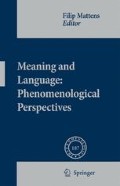The communication of insight—be it through a transcription, translation, a seminar or classroom lecture—is a philosophical task as old as Plato. Phenomenological insight, according to Husserl, is to be gained by temporarily “bracketing” the various presuppositions of the different realms of human activity for the purpose of intuiting the essential structures of experience that appear to a consciousness purified by the method of the epoché. And Husserl makes it abundantly clear that an essential part of phenomenology’s task is the communication of phenomenology’s insights to the various regions of human activity which it claims to ground through its activity. It is through such communication that phenomenology invites humanity to return to “the things themselves” that underlie all of our various preconceptions of these things, so that it may have a deeper understanding of the lived world common to all. This is often forgotten about phenomenology: it is not only about intuition, but also expression.
Access this chapter
Tax calculation will be finalised at checkout
Purchases are for personal use only
Preview
Unable to display preview. Download preview PDF.
Bibliography
Suzanne Bachelard, A Study of Husserl’s “Formal and Transcendental Logic,” trans. Lester E. Embree (Evanston, IL: Northwestern University Press, 1968).
M. M. Bakhtin, The Dialogic Imagination, trans. Caryl Emerson and Michael Holquist (Austin, TX: University of Texas Press, 1981). Angela Ales Bello, editor, Analecta Husserliana, vol. 11 (Dordecht: Reidel, 1981).
Rudolf Bernet, “Husserl’s Theory of Signs Revisited,” in: Sokolowski, Edmund Husserl and the Phenomenological Tradition.
——, Iso Kern and Eduard Marbach, An Introduction to Husserlian Pheno-menology (Evanston, IL: Northwestern University Press, 1993).
——, “Derrida and His Master’s Voice,” in: McKenna and Evans, Derrida and Phenomenology.
Richard Cobb-Stevens, Husserl and Analytic Philosophy (Dordrecht: Kluwer Academic Publishers, 1990).
Jacques Derrida, Speech and Phenomena, and other Essays on Husserl’s The-ory of Signs, trans. David B. Allison (Evanston, IL: Northwestern University Press, 1973).
——, Edmund Husserl’s “Origin of Geometry”: An Introduction, trans. J. P. Leavey Jr. (Stony Brook, NY: Nicolas Hays, Ltd., 1978).
R.O. Elveton, translator and editor, The Phenomenology of Husserl: Selected Critical Readings (Chicago, IL: Quadrangle Books, 1970).
J. Claude Evans, “Indications and Occasional Expressions,” in: McKenna and Evans, Derrida and Phenomenology.
Fred Evans, Psychology and Nihilism: A Genealogical Critique of the Compu-tational Model of Mind (Albany, NY: State University of New York Press, 1993).
——, “Bakhtin, Communication, and the Politics of Multiculturalism” in Constellations: An International Journal of Critical and Democratic Theory V:3 (1998), 403-423.
Eugen Fink, “The Phenomenological Philosophy of Edmund Husserl and Contemporary Criticism,” in: Elveton, The Phenomenology of Husserl: Selected Critical Readings.
——, Sixth Cartesian Meditation: The Idea of a Transcendental Theory of Method, trans. Ronald Bruzina (Bloomington, IN: Indiana University Press, 1994).
Edmund Husserl, Cartesian Meditations: An Introduction to Phenomenology, trans. Dorion Cairns, (The Hague: M. Nijhoff, 1960).
——, The Idea of Phenomenology, trans. William P. Alston and George Nakhnikian (The Hague: Martinus Nijhoff, 1964).
——, “Philosophy as a Rigorous Science,” in: Lauer, Phenomenology and the Crisis of Philosophy.
——, Formal and Transcendental Logic, trans. Dorion Cairns (The Hague: Martinus Nijhoff, 1969).
——, Logical Investigations, volume I, trans. J. N. Findlay (London: Rout-ledge and Kegan Paul; New York: Humanities Press, 1970). ——, The Crisis of European Sciences and Transcendental Phenomenology, trans. David Carr (Evanston, IL: Northwestern University Press, 1970).
——, Ideas on a Pure Phenomenology and Phenomenological Philosophy, First Book, trans. F. Kersten (Dordrecht, The Netherlands: Kluwer Academic Publishers, 1982).
——, Ideas pertaining to a Pure Phenomenology and to a Phenomenologi-cal Philosophy, Second Book, trans. R. Rojcewicz and A. Schuwer (Dordrecht: Kluwer Academic Publishers, 1989).
Erazim Kohák, The Embers and the Stars (Chicago, IL: University of Chicago Press, 1986).
Quentin Lauer, translator and editor, Phenomenology and the Crisis of Philosophy (New York: Harper & Row, 1965).
W. R. McKenna and J. C. Evans, editors, Derrida and Phenomenology (Dordrecht: Kluwer Academic Publishers, 1995).
Maurice Merleau-Ponty, Phenomenology of Perception, trans. Colin Smith (London: Routledge & Kegan Paul, Ltd., 1962).
J. N. Mohanty, Edmund Husserl’s Theory of Meaning, 2nd ed. (The Hague: Martinus Nijhoff, 1969).
——, editor, Readings on Edmund Husserl’s “Logical Investigations” (The Hague: Martinus Nijhoff, 1977).
——, “The Development of Husserl’s Thought,” in: Smith and Smith, The Cambridge Companion to Husserl.
Renzo Raggiunti, “The Language Problem in Husserl’s Phenomenology,” in: Bello, Analecta Husserliana, vol. 11.
Peter Simons, “Meaning and Language” in: Smith and Smith, The Cam-bridge Companion to Husserl.
Barry Smith and David Woodruff Smith, editors, The Cambridge Compan-ion to Husserl (New York: Cambridge University Press, 1995).
Robert Sokolowski, “The Structure and Content of Husserl’s Logical Investigations,” Inquiry 14 (1971), 318-350.
——, Presence and Absence: A Philosophical Investigation of Language and Being (Bloomington, IN: Indiana University Press, 1978).
——, “The Logic of Parts and Wholes in Husserl’s Logical Investigations,” in: Mohanty, Readings on Edmund Husserl’s “Logical Investigations.”
——, editor, Edmund Husserl and the Phenomenological Tradition (Washing-ton, DC: Catholic University of America Press, 1988).
Donn Welton, The Origins of Meaning: A Critical Study of the Thresholds of Husserlian Phenomenology (The Hague: Martinus Nijhoff, 1983).
Author information
Authors and Affiliations
Editor information
Editors and Affiliations
Rights and permissions
Copyright information
© 2008 Springer Science + Business Media B.V
About this chapter
Cite this chapter
Koukal, D.R. (2008). The Necessity of Communicating Phenomenological Insights–and its Difficulties. In: Mattens, F. (eds) Meaning and Language: Phenomenological Perspectives. Phaenomenologica, vol 187. Springer, Dordrecht. https://doi.org/10.1007/978-1-4020-8331-0_13
Download citation
DOI: https://doi.org/10.1007/978-1-4020-8331-0_13
Publisher Name: Springer, Dordrecht
Print ISBN: 978-1-4020-8330-3
Online ISBN: 978-1-4020-8331-0
eBook Packages: Humanities, Social Sciences and LawPhilosophy and Religion (R0)

